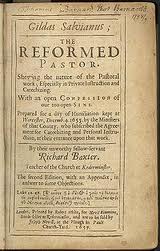Introduction to "The Reformed Pastor" by Richard Baxter
This book edited by William Brown and published through Banner of Truth Trust in 1974, is remarkable writ. I use the term writ as this copy of the 1862 version summons us to bear witness to the passion and commanding pleas of Richard Baxter, not to mention the truths we can glean from such. Below I have attempted to provide a glimpse into the mind and heart of Richard Baxter. Keeping in mind that the points I make and questions I ask have passed through this man’s personal perspective with all its potential imperfections and distortions, not to mention limited knowledge and study. I ask therefore in advance that you please forgive any ignorance or ill wording discovered and, albeit kindly, enlighten us with your views. Lets begin.
As I began to read The Reformed Pastor I soon discovered a man zealous for the Lord and deeply devoted to the Lord’s work. A passionate man of strong conviction surely cannot be contested. It soon became apparent though that Richard Baxter faced some very challenging times. There were, in his mind, few qualified ministers and many in need of discipleship. The world was changing. Political and religious unrest abounded and the church was in disarray from Baxter’s point of view.
I also was to discover that Baxter was a hard man to read theologically. His contemporaries of his time found him a tad off the conventional path of Reform Theology, to say the least, particularly due to his earlier writings specifically regarding justification. It has also been suggested by those who have studied his works, that his passions for evangelism produced a bend towards ‘Hypothetical Universalism’ (though this may be theoretically and speculatively based upon his association with John Preston), and that he viewed the more conventional theology of ‘free grace’ as too close to an extremist view of ‘Antinomian’ doctrine - a term coined by Martin Luther. During this study other related matters have surfaced - ‘conditional’ and ‘particular election’, supralapsarianism, infralapsarianism, and Amyraldian order of decrees, post-redemptionism (also known as Moderate Calvinism or Four-point Calvinism), the Church of England Catechism and the Synod of Dort pronouncement, and much more. Each has come to play and all of which are too extensive and complex to delve into here.
In the introduction of this book (noted not to be included in the online pdf version), J. I. Packer shares his assessment of the man. “Baxter was a big man, big enough to have big faults and make big errors. A brilliant crossbencher widely learned with an astounding capacity for instant analysis, argument and appeal…. Yet he could not always use his great gifts in the best way. In theology, for instance, he devised a eclectic middle route between, Reformed, Arminian and Roman doctrines of grace; interpreting the kingdom of God in terms of contemporary political ideas, he explained Christ’s death as an act of universal redemption (penal and vicarious, but not substitutionary), in virtue of which God has made a new law offering pardon and amnesty to the penitant. Repentance and faith, being obedience to this law, are the believers personal saving righteousness. Baxter, a Puritan conservative, saw this quaint legalistic construction as focusing both the essential Puritan and New Testament gospel and also common ground about grace which the warring Trinitarian theologies of his day actually occupied. Others, however, saw that ‘Baxterianism’ (or ‘Neo-nomianism’, as it was called) because of the ‘new law’ idea at its heart) altered the content of the Puritan gospel, while its ‘political meathod’, if taken seriously, was objectionably rationalistic. Time proved them right; the fruits of the seeds which Baxter sowed neonomian Moderatism in Scotland and moralistic Unitarianism in England.” Packer asserts that Baxter’s theology violates the conventional creeds of Reformed theology and contends, “As a devotional writer, no praise of him can be too high; but as a theologian he was, though brilliant, something of a disaster.”
Lynell Friesen in a document called “The Work and Thought of Richard Baxter”, quotes that Baxter maintains his allegiance to the Canons of Dordrecht of 1618 - 1619 - “I subscribe to the Synod; yea, in the article of the extent of redemption, wherein I am most suspected and accused, I do subscribe to the Synod of Dort without any exception, limitation, or exposition, of any word, as doubtful and obscure.” However, by Baxter’s own admission, noted also by Lynell Friesen - “The Work and Thought of Richard Baxter”, he is quoted on more than one occasion of making statements contrary to the prevalent views represented in the Reformed Church theological orthodoxy, and so despite this statement, Baxter’s contemporaries remained unconvinced and continued to challenge his positions.
Are these fair and accurate assessments Packer, Friesen and others are making? You must decide. God honoring convictions cannot be reliably formed apart from ones own thorough study of biblical theology. It falls to you then to pursue biblical truth.
“Study and be eager and do your utmost to present yourself to God approved (tested by trial), a workman who has no cause to be ashamed, correctly analyzing and accurately dividing [rightly handling and skillfully teaching] the Word of Truth.”
2 Timothy 2:15 (Amplified Bible)
Context, historical accounts, language and culture all play a part in forming a biblical worldview. And then there is the text. How does it read? We must let the scripture speak and be diligent to lay hold of all the aspects which contribute to its meaning. We must resist the temptation to make it say what it does not say and we must resist the temptation to vindicate our own arguments. Our poise should be to remain objectively submitted to the authority of the scripture. There is certainly a plethora of resource out there to assist you on your quest of discovery. Many presenting their arguments. Making statements. You will find that not all agree. Not to be dissuaded though, you should remember that some of these are age-old contentions. Some lines drawn in the sand years ago are still drawn today. Some views are extreme while others may seem immaterial. Most, if not all seem to use scripture as their foundation for their argument. Christianity has suffered these arguments for centuries, and must needs be. This world and this world’s mindset are hostile to the truth, and though truth does not change from generation to generation, it is constantly being challenged. The accurate declaration of the gospel is a mighty charge - 2 Peter 3: 14-18 (ESV) – it must not be adulterated. We are stewards of His word and it is our charge to keep the gospel from being exploited and manipulated by the ignorance and carnality men may succumb to. As Ambassadors of His word, it is then our duty to learn to “rightly handle the word of truth” and rightly communicate it. As many people have discovered communication is a skill that constantly needs tweaking. Articulating something and being understood can lay far apart. For most, bringing these two together takes work. An applicable quote of Richard Baxter follows, “Nothing more cheats the ignorant than ambiguous words.” We must be clear and present our argument accurately and logically. It is a battle for biblical truth and scriptural understanding. In the end when the smoke clears, it won’t be our arguments, contentions and philosophies that will be left standing in the lime light and receiving praise, God’s Word alone shall remain, and we will praise Him for it. - 1 Corinthians 13:12.
Notwithstanding the contraventions Baxter’s theology presents, it is the finer points of his supplication that we must embrace as nothing less than the watchman’s voice bringing noble admonition towards humility, compassion, devotion, integrity and accountability. A charge relevant to us today. Throughout the first chapter we hear Baxter asserting that a Christian must be diligent in his personal ‘condition’ (sanctification), hence the persistent warnings to “take heed for yourselves” less one discovers they have fallen short in their witness and mission, and in the course, defamed the cause and testimony of Christ. Baxter’s cry must be the conscientious pursuit of each minister of God in order to bring this same pursuance to the masses. His admonition is worthy of our ears and it behooves us to pursue the reading of this book. Although many of his contemporaries questioned his theological views, Baxter is held as a highly intelligent, excellent pastor and evangelist. Thus this book contains more to be praised and adopted then questioned and resisted. We cannot get lost in the incidentals at the cost of the true wine Baxter pours out in defense of the testimony and mission of Jesus. There may be discrepancies concerning doctrinal views, and as such discrepancies may exist, my hope is in acknowledging these, we will be free to move past them and glean from this book its true treasure.
We will focus our next posting on Chapter One - The Oversight Of Ourselves. To review these please click on Richard Baxter: The Reformed Pastor under 'Book Series' at the top right. Scroll down to the bottom and click on 'Older Posts'. This will take you to Chapter One. (The postings show from the last - top - to the first - bottom). To review Chapter two you will need to click on 'Newer posts' at the bottom left of Chapter One post which will take you to the last posting of the series. From here scroll down to the bottom and review in reverse order. Complicated? I know but I didn't develop this blog engine. Sorry.
Further Study
*The Work and Thought of Richard Baxter by Lynell Friesen – PDF online
*Aphorisms of Justification – 1655 edition -http://books.google.com/books?id=Nw0DAAAAQAAJ&printsec=frontcover#v=onepage&q&f=false
*Definition of Neonomianism - http://en.wikipedia.org/wiki/Neonomianism




Comments
Post a Comment